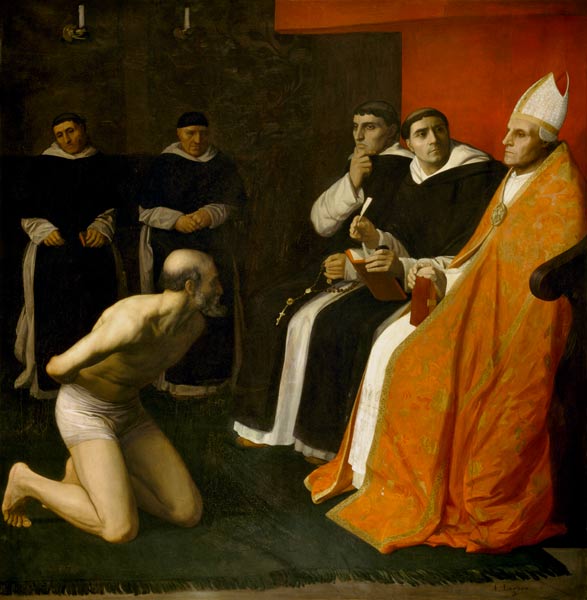If we lived just five or ten years between birth, maturity, and death, we might more easily – assuming proper faith formation – hold to the high moral requirements of Christianity. But living 80 or 90 years – all those days and hours – makes it hard not to sin and then, as the Protestants like to say, backslide. The Catholic Church has a remedy for that: Confession.
Consider Christ’s words about forgiveness to Peter (Matthew 18:21-35). The future first pope asked, “Lord, if my brother sins against me, how often must I forgive him? As many as seven times?” And you know what Jesus replied: not seven times but seventy times seven. (He says a lot more in the parable that follows, and it’s really, really chilling.)
Now Biblical scholars tell us that the Lord isn’t being specific doing math here: He’s not saying we ought to forgive a sinning brother 490 times. He is saying that forgiveness, which ultimately comes from the Father, is all but limitless. Although, again, what follows in the Lord’s oration is a portent about Purgatory, if not of Hell itself.
From this we may conclude that when a man heads to the Sacrament of Penance to confess the same sin for the 491st time. . . it’s okay! Praise the Lord!, as our Protestant friends would say.
Of course, this would be some pretty impressive sinning, and, if our sinner were face-to-face with the same priest for every one of these confessions, the priest might be inclined to say on the occasion of confession #491:
“Listen, I’m not sure I should give you absolution this time, because I’m pretty sure I’m not seeing contrition here.”
“But I am contrite!”
“So you say. But, if so, you need to see a psychiatrist, because you’re also a special kind of crazy: doing the same thing over and over again, and still expecting forgiveness.”
“But. . .”
“No! You’ve convinced me Jesus really was giving a specific instruction when he said to forgive 70 times 7, and you’re over the limit.”
“But. . .”

“Have you thought what would happen if, after the 492nd time you committed this same sin, you walked across the street and got hit by a bus? And died? I mean this is some alarming recidivism you’ve got going!”
“I’m sorry . . .”
“I don’t think so. You’re embarrassed now because I’m sick and tired of hearing you blather on about what you’re blathering on about and I’m fed up. That is what you’re sorry about. If you were truly repentant, you wouldn’t commit the same sin over and over. You’re using Confession as a justification for the next time you fall. ‘Oh, well, I’ll just go see Father, and he’ll absolve me . . .’ The confessional, you may have noticed, does not have a revolving door. If ever there were a case of having your cake and eating it too, well . . . you take the cake. Come to think of it, you’re not only guilty of lust, but you’re also a glutton; you just can’t get enough, can you? As matter of fact, you’re also guilty of sloth, because you make no effort to actually change, and let’s throw in pride while we’re at it because it takes serious arrogance to mock God in this way. I’ll give you the Latin for each of those: luxuria, gula, acedia, and superbia. Well done, my friend: that’s four of the Seven Deadly sins!”
“You can’t speak to me like this!”
“Aha, there’s anger, ira! Now all you have to do is confess to envy and greed, and you’ve got all seven.”
“I’m getting out of here. You’re the crazy one! I’m gonna write a letter to the Cardinal, and we’ll see what he has to say about an old priest who won’t give absolution to a poor sinner! How do you like that!?”
“No problem. I am an old priest. There’s nothing His Eminence can do to me that would affect my life a whit. And be sure to tell him in your letter what you were confessing – for the 491sttime.”
“You wouldn’t dare tell him!”
“No, I wouldn’t because I can’t, but you should. He might give you some fatherly advice, of which – in your case – I am finally bereft. And another thing: every single time you come in here you have a story – ‘See, Father, I’ve been feeling especially lonely’ or ‘This lady I went out with was dressed in an alluring fashion.’ We priests do not need to hear your obvious and ludicrous attempt to explain why you were justified in sinning as you did. Number and kind – that’s all and only what you need to say.”
“You don’t think the context matters –”
“Context! Con– . . . You’ve got to be kidding. Here’s the way it’s supposed to work: you do something wrong; you know it’s wrong; you come to Confession; you confess – NUMBER and KIND; you heartily resolve not to do it again; you receive absolution; you do your penance, and you DO NOT SIN AGAIN. Well, we all sin, but you – I’m talking about Y-O-U – don’t do the same bad thing again! As I say, you need a shrink, not a priest.”
“Give me my absolution! Give me my penance!”
“Listen to yourself: gimme, gimme! Say, that’s avaritia. Six! Show me invidia and I will absolve you after all. Go on, sinner: go for all seven!”
*Image: An Honourable Penitent by Alphonse Legros, c. 1868 [Musée d’Orsay, Paris]















